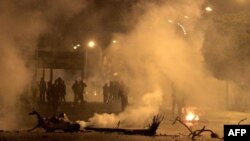Riots and looting shook parts of Tunisia early Sunday, days after the country marked the 10th anniversary of the resignation of long-time President Zein el Abidine Ben Ali in an Arab Spring revolution. The riots also came as Prime Minister Hichem Mechichi announced a major ministerial reshuffle Saturday.
Arab media broadcast amateur video of crowds of young men setting fires and looting banks and private businesses in a second day of violence in a number of Tunisian cities.
The Interior Ministry reported that 242 people were arrested in the wake of the violence.
Prime Minister Hichem Meshishi said in a public address Saturday that he was presenting a ministerial reshuffle to parliament to try and alleviate corruption, unemployment and economic woes plaguing the country.
He says that the coming months pose a serious threat and reforms must be made to the economy along with efforts to redress social injustice and underdevelopment. More cooperation is also needed at the ministerial level, he adds, and this is the reason for the decision to reshuffle the Cabinet.
Egyptian political sociologist Said Sadek, speaking to VOA from Tunisia, says the majority of the rioters were "teenagers and young men," and that police have been "reluctant to crack down on them due to criticism of brutality by various political parties."
Sadek notes that many Tunisians are not happy with the current situation, either economically or politically, and many feel that politicians don't care about the fate of ordinary people.
"This model of the Arab Spring is facing a lot of difficulties despite all the Western media coverage and the image that this is a success. Inside the country, people are not feeling or seeing any success. They don't have bread, they don't have water, (and) security of the country is problematic," he said.
The government announced a four-day lockdown last week, saying the move was due to a surge in the number of coronavirus cases. Some analysts, however, say the lockdown was meant to prevent possible violence on the anniversary of thedeparture of former President Ben Ali on January 14, 2011.
Tunisia has been facing serious economic problems in the years since the departure of Ben Ali and the recent coronavirus crisis has left the country with a budget shortfall. Tunisians also say the government does not have enough money to buy enough vaccines for its population.
The "Arab Spring" revolution in Tunisia broke out in Dec. 2010 after a young vegetable seller by the name of Mohammed Bouazizi set fire to himself to protest economic conditions and alleged police brutality. It was the first of revolutions across the Arab world, in places like Egypt, Libya, Yemen and Syria.
Despite the overthrow of dictatorial governments like that of Zein el Abidine Ben Ali in Tunisia in 2011, many of the demands and aspirations of protesters were never fulfilled, leading to periodic outbursts of public anger like the latest rioting and violence of the past several days.




